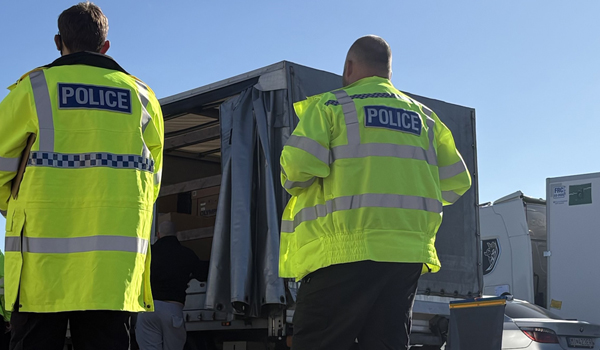Police crackdown on organised immigration crime in first multi-agency operation of its kind
Organised gangs behind immigration crime were targeted by law enforcement in the first multi-agency operation of its kind across England and Wales.
Operation Lockstream saw more than 5,500 people questioned in relation to organised immigration crime, 34 people refused entry into the UK and 51 arrested for immigration offences.
Led by the Organised Immigration Crime Domestic Taskforce, the crackdown throughout September involved police forces and agencies including the National Police Chiefs’ Council (NPCC), Home Office, Border Force, National Crime Agency (NCA), HMRC, Immigration Enforcement and Joint Maritime Security Centre.
This is the first action of its kind run by the new taskforce, set up in May 2025 as a multi-agency approach to transform the way in which the police respond to organised immigration crime gangs operating from the UK.
The activity involved stepping up patrols at ports, extra checks on roads and airports, and neighbourhood teams targeting potential grey economy exploitation.
The NPCC says organised immigration crime is often linked with drug trafficking and distribution, modern slavery and human trafficking. Criminal gangs use a variety of transport methods to bring migrants to and from the UK illegally, this includes small boats, air travel and accompanied and unaccompanied freight.
The Taskforce’s lead, Deputy Chief Constable Wendy Gunney, said: “The purpose of the OIC taskforce is to create a hostile environment for people who come to the UK to commit any form of criminality.
“Organised crime groups see migrants as money making commodities, not as human beings and our aim is to target and disrupt their efforts.
“Operation Lockstream has laid the foundations for this to happen; with UK law enforcement agencies working together it has leveraged an integrated approach to tackle inland organised immigration crime here in the UK.
“We’ve seen a number of agencies at airports, arterial roads, ports and within local areas, identifying people abusing the law and gaining insight into their tactics.
“It has been a huge endeavour by all officers, staff and agencies involved, garnering brilliant results and intelligence, which in turn will support law enforcement to spot patterns and understand these networks.
“As Op Lockstream continues, people will also continue to be identified and brought to justice as we collectively crackdown on organised criminality.”
In total, 5,516 people were questioned and 68 arrested, with 51 for alleged immigration offences
Thirty-four people were refused entry and 36 false documents seized. In addition, 1,204 vehicles, vessels and flights were also stopped and searched.
More than £216,000 was taken from cash seizures, fixed penalty notices and civil penalties, in which the latter related to breaches of the code of practice designed to prevent clandestine entry.
The crackdown spanned the breadth of England and Wales and sought to confront a variety of ways in which criminals were exploiting the movement and management of people who are illegally in the UK and who are linked to organised crime.
This included four ‘pillars’ of action, with the operation focused on one area of criminality per week within September:
- A multi-agency deployment at rest points on the M1 where officers stopped vehicles suspected of being linked to illegal immigration or exploitation;
- Patrols of the shores and ports of Devon and Cornwall to detect clandestine entries into the UK;
- Deployment to airports to identify if Common Travel Areas were being exploited by organised criminals who often try to smuggle cash out of the country via these routes; and
- Proactive operations in forces looking into cash-intensive and illicit businesses across the country, which are used to launder money and can be operated by illegal workers.
Minister for Migration and Citizenship Mike Tapp said: “This specialist taskforce is a fantastic example of the collaboration between police, Immigration Enforcement, Border Force and wider law enforcement to stop organised immigration crime in its tracks.
“I saw first-hand the rapid work of officers and staff to arrest and detain two Albanian migrants with no right to be here – and who we will seek to swiftly remove.
“We are ramping up activity to disrupt criminal gangs and secure UK borders. We’ve increased illegal working visits and arrests by 50 per cent and returned 35,000 people with no right to be here.”
NCA Director of Threat Leadership, Alex Murray, added: “Tackling organised immigration crime is a priority for the NCA, and we are working with law enforcement partners in the UK and overseas to target, disrupt and dismantle the gangs involved in any way we can.
“UK-based criminals are involved in this threat and we are working with policing to focus on them, including targeting criminal network supply lines, transport routings, finances and their wider business models. Overall, the aim of activity like this is to make the UK a more difficult place for these criminal gangs to operate, and we will continue to support it.”


